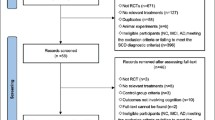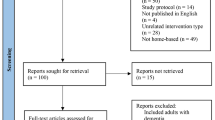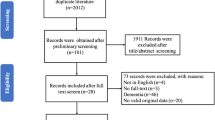Abstract
Background
The state of mild cognitive impairment (MCI) provides an optimal window for preventing progression to dementia. Combined cognitive intervention and physical exercise may yield additive and synergistic effects on cognition in older adults with MCI.
Objectives
The purpose of this study was to assess the efficacy of a combined intervention to improve cognition in older adults with MCI by comparing a control group that underwent only cognitive intervention, a control group that underwent only physical exercise, and a control group that did not undergo cognitive intervention or physical exercise.
Design
Meta-analysis of randomized controlled trials (RCTs).
Data sources
The online databases of PubMed, Web of Science, Embase, the Cochrane Library, PsycINFO, and CINAHL were systematically searched.
Review methods
The outcomes were global cognition, memory, and executive function/attention. A sensitivity analysis was conducted when the I2 statistic was > 50%.
Results
A total of 16 studies were included. The results showed that the combined intervention had positive effects on global cognition compared to the effects of the other control group [SMD = 0.27, 95% CI (0.09, 0.44), p = 0.003]. Regarding memory, the combined intervention had positive effects compared to the effects observed in the single physical exercise group [SMD = 0.25, 95% CI (0.07, 0.44), p = 0.006] and the other control group [SMD = 0.29, 95% CI (0.12, 0.47), p = 0.001]. For executive function/attention, the combined intervention had also positive effects compared to the effects of the single cognitive intervention group [SMD = 0.28, 95% CI (0.09, 0.47), p = 0.004], the single physical exercise group [SMD = 0.32, 95% CI (0.16, 0.49), p = 0.0002], and the other control group [SMD = 0.23, 95% CI (0.05, 0.41), p = 0.01].
Conclusions
The combined intervention resulted in cognitive benefits in older adults with MCI and exhibited limited superiority over the single cognitive intervention and the single physical exercise on cognitive subdomains.


Similar content being viewed by others
References
Alzheimer's Disease International. World Alzheimer Report 2018: The state of the art of dementia research: New frontiers [EB/OL]. [2018–09–01]. https://www.alz.co.uk/research/WorldAlzheimerReport2018.pdf
Global action plan on the public health response to dementia 2017–2025 [EB/OL]. [2019–02–10]. https://www.who.int/mental_health/neurology/dementia/action_plan_2017_2025/en/
Hampel H, Lista S (2016) Dementia: The rising global tide of cognitive impairment. Nat Rev Neurol 12:131–132. https://doi.org/10.1038/nrneurol.2015.250
Roberts RO, Knopman DS, Mielke MM et al (2014) Higher risk of progression to dementia in mild cognitive impairment cases who revert to normal. Neurology 82:317–325. https://doi.org/10.1212/WNL.0000000000000055
Petersen RC, Lopez O, Armstrong MJ et al (2018) Author response: Practice guideline update summary: Mild cognitive impairment: Report of the Guideline Development, Dissemination, and Implementation Subcommittee of the American Academy of Neurology. Neurology 91:373–374. https://doi.org/10.1212/WNL.0000000000006042
Simon SS, Yokomizo JE, Bottino CM (2012) Cognitive intervention in amnestic Mild Cognitive Impairment: a systematic review. Neurosci Biobehav Rev 36:1163–1178. https://doi.org/10.1016/j.neubiorev.2012.01.007
Huckans M, Hutson L, Twamley E et al (2013) Efficacy of cognitive rehabilitation therapies for mild cognitive impairment (MCI) in older adults: working toward a theoretical model and evidence-based interventions. Neuropsychol Rev 23:63–80. https://doi.org/10.1007/s11065-013-9230-9
Liang JH, Shen WT, Li JY et al (2019) The optimal treatment for improving cognitive function in elder people with mild cognitive impairment incorporating Bayesian network meta-analysis and systematic review. Ageing Res Rev 51:85–96. https://doi.org/10.1016/j.arr.2019.01.009
Hong YJ, Jang EH, Hwang J et al (2015) The efficacy of cognitive intervention programs for mild cognitive impairment: a systematic review. Curr Alzheimer Res 12:527–542. https://doi.org/10.2174/1567205012666150530201636
Yang HL, Chan PT, Chang PC et al (2018) Memory-focused interventions for people with cognitive disorders: a systematic review and meta-analysis of randomized controlled studies. Int J Nurs Stud 78:44–51. https://doi.org/10.1016/j.ijnurstu.2017.08.005
Öhman H, Savikko N, Strandberg TE et al (2014) Effect of physical exercise on cognitive performance in older adults with mild cognitive impairment or dementia: a systematic review. Dement Geriatr Cogn Disord 38:347–365. https://doi.org/10.1159/000365388
Song D, Yu D, Li P et al (2018) The effectiveness of physical exercise on cognitive and psychological outcomes in individuals with mild cognitive impairment: a systematic review and meta-analysis. Int J Nurs Stud 79:155–164. https://doi.org/10.1016/j.ijnurstu.2018.01.002
Zhu X, Yin S, Lang M et al (2016) The more the better? A meta-analysis on effects of combined cognitive and physical intervention on cognition in healthy older adults. Ageing Res Rev 31:67–79. https://doi.org/10.1016/j.arr.2016.07.003
Karssemeijer E, Aaronson JA, Bossers WJ et al (2017) Positive effects of combined cognitive and physical exercise training on cognitive function in older adults with mild cognitive impairment or dementia: A meta-analysis. Ageing Res Rev 40:75–83. https://doi.org/10.1016/j.arr.2017.09.003
Schwenk M, Sabbagh M, Lin I et al (2016) Sensor-based balance training with motion feedback in people with mild cognitive impairment. J Rehabil Res Dev 53:945–958. https://doi.org/10.1682/JRRD.2015.05.0089
Delbroek T, Vermeylen W, Spildooren J (2017) The effect of cognitive-motor dual task training with the biorescue force platform on cognition, balance and dual task performance in institutionalized older adults: a randomized controlled trial. J Phys Ther Sci 29:1137–1143. https://doi.org/10.1589/jpts.29.1137
Shimada H, Makizako H, Doi T et al (2018) Effects of combined physical and cognitive exercises on cognition and mobility in patients with mild cognitive impairment: a randomized clinical trial. J Am Med Dir Assoc 19:584–591. https://doi.org/10.1016/j.jamda.2017.09.019
Law L, Mok V, Yau M (2019) Effects of functional tasks exercise on cognitive functions of older adults with mild cognitive impairment: a randomized controlled pilot trial. Alzheimers Res Ther 11:98. https://doi.org/10.1186/s13195-019-0548-2
Amjad I, Toor H, Niazi IK et al (2019) Xbox 360 kinect cognitive games improve slowness, complexity of EEG, and cognitive functions in subjects with mild cognitive impairment: a randomized control trial. Games Health J 8:144–152. https://doi.org/10.1089/g4h.2018.0029
Yang C, Moore A, Mpofu E et al (2019) Effectiveness of combined cognitive and physical interventions to enhance functioning in older adults with mild cognitive impairment: a systematic review of randomized controlled trials. Gerontologist. https://doi.org/10.1093/geront/gnz149
Moher D, Liberati A, Tetzlaff J et al (2009) Preferred reporting items for systematic reviews and meta-analyses: the PRISMA statement. Ann Intern Med 151:264–269. https://doi.org/10.7326/0003-4819-151-4-200908180-00135
Higgins JP, Altman DG, Gøtzsche PC et al (2011) Cochrane bias methods group, & cochrane statistical methods group. The Cochrane Collaboration’s tool for assessing risk of bias in randomised trials. BMJ 343:d5928. https://doi.org/10.1136/bmj.d5928
Borrenstein M, Hedges LV, Higgins JP et al (2009) Introduction to Meta-Analysis. John Wiley & Sons, United Kingdom . https://doi.org/10.1002/9780470743386
Cohen J (1992) A power primer. Psychol Bull 112:155–159. https://doi.org/10.1037/0033-2909.112.1.155
Higgins JP, Green S (Eds.) (2011) Cochrane Handbook for Systematic Reviews of Interventions. John Wiley & Sons 4 http://refhub.elsevier.com/S0020-7489(18)30002-6/sbref0110
Fiatarone Singh MA, Gates N, Saigal N et al (2014) The study of mental and resistance training (SMART) study-resistance training and/or cognitive training in mild cognitive impairment: a randomized, double-blind, double-sham controlled trial. J Am Med Dir Assoc 15:873–880. https://doi.org/10.1016/j.jamda.2014.09.010
Hagovska M, Nagyova I (2016) The transfer of skills from cognitive and physical training to activities of daily living: a randomised controlled study. Eur J Ageing 14:133–142. https://doi.org/10.1007/s10433-016-0395-y
Suzuki T, Shimada H, Makizako H et al (2013) A randomized controlled trial of multicomponent exercise in older adults with mild cognitive impairment. PLoS ONE 8:e61483. https://doi.org/10.1371/journal.pone.0061483
Griffiths J, Thaikruea L, Wongpakaran N et al (2020) Effects of combined physical movement activity and multifaceted cognitive training in older people with mild neurocognitive disorder in a rural community: a randomized control trial. Dement Geriatr Cogn Disord 49:194–201. https://doi.org/10.1159/000507922
Park JS, Jung YJ, Lee G (2020) Virtual reality-based cognitive-motor rehabilitation in older adults with mild cognitive impairment: a randomized controlled study on motivation and cognitive function. Healthcare (Basel) 8:335. https://doi.org/10.3390/healthcare8030335
Xu Z, Zhang D, Lee ATC et al (2020) A pilot feasibility randomized controlled trial on combining mind-body physical exercise, cognitive training, and nurse-led risk factor modification to reduce cognitive decline among older adults with mild cognitive impairment in primary care. PeerJ 8:9845. https://doi.org/10.7717/peerj.9845
Hughes TF, Flatt JD, Fu B et al (2014) Interactive video gaming compared to health education in older adults with MCI: a feasibility study. Int J Geriatr Psych 29:890–898. https://doi.org/10.1002/gps.4075
Lam LC, Chan WC, Leung T et al (2015) Would older adults with mild cognitive impairment adhere to and benefit from a structured lifestyle activity intervention to enhance cognition?: a cluster randomized controlled trial. PLoS ONE 10:e0118173. https://doi.org/10.1371/journal.pone.0118173
Anderson-Hanley C, Barcelos NM, Zimmerman EA (2018) The Aerobic and cognitive exercise study (ACES) for community-dwelling older adults with or at-risk for mild cognitive impairment (MCI): neuropsychological, neurobiological and neuroimaging outcomes of a randomized clinical trial. Front Aging Neurosci 10:76. https://doi.org/10.3389/fnagi.2018.00076
Laure CD, Alexandra P, Sylvie B et al (2018) Effects of simultaneous aerobic and cognitive training on executive functions, cardiovascular fitness and functional abilities in older adults with mild cognitive impairment. Ment Health Phys Act. https://doi.org/10.1016/j.mhpa.2018.06.001
Köbe T, Witte AV, Schnelle A et al (2016) Combined omega-3 fatty acids, aerobic exercise and cognitive stimulation prevents decline in gray matter volume of the frontal, parietal and cingulate cortex in patients with mild cognitive impairment. Neuroimage 131:226–238. https://doi.org/10.1016/j.neuroimage.2015.09.050
Sachdev PS, Blacker D, Blazer DG et al (2014) Classifying neurocognitive disorders: the DSM-5 approach. Nat Rev Neurol 10:634–642. https://doi.org/10.1038/nrneurol.2014.181
Bherer L (2015) Cognitive plasticity in older adults: effects of cognitive training and physical exercise. Ann N Y Acad Sci 1337:1–6. https://doi.org/10.1111/nyas.12682
Foster PP, Rosenblatt KP, Kuljiš RO (2011) Exercise-induced cognitive plasticity, implications for mild cognitive impairment and Alzheimer’s disease. Front Neurol 2:28. https://doi.org/10.3389/fneur.2011.00028
Fabel K, Kempermann G (2008) Physical activity and the regulation of neurogenesis in the adult and aging brain. Neuromolecular Med 10:59–66. https://doi.org/10.1007/s12017-008-8031-4
Fabel K, Wolf SA, Ehninger D et al (2009) Additive effects of physical exercise and environmental enrichment on adult hippocampal neurogenesis in mice. Front Neurosci 3:50. https://doi.org/10.3389/neuro.22.002.2009
Kempermann G, Fabel K, Ehninger D et al (2010) Why and how physical activity promotes experience-induced brain plasticity. Front Neurosci 4:189. https://doi.org/10.3389/fnins.2010.00189
Wang Z, Dong B (2018) Screening for cognitive impairment in geriatrics. Clin Geriatr Med 34:515–536. https://doi.org/10.1016/j.cger.2018.06.004
American Psychiatric Association (1994) Diagnostic and statistical manual of mental disorders (DSM-IV). Washington, DC: American Psychiatric Association http://refhub.elsevier.com/S0749-0690(18)30997-2/sref2
Law LL, Barnett F, Yau MK et al (2014) Effects of combined cognitive and exercise interventions on cognition in older adults with and without cognitive impairment: a systematic review. Ageing Res Rev 15:61–75. https://doi.org/10.1016/j.arr.2014.02.008
McEwen SC, Siddarth P, Rahi B et al (2018) Simultaneous aerobic exercise and memory training program in older adults with subjective memory impairments. J Alzheimer’s Dis 62:795–806. https://doi.org/10.3233/JAD-170846
Acknowledgements
This work was supported by the Health and Family Planning Committee of Jilin Province, China [grant numbers 2020J036] and the Education Department of Jilin Province, China [grant numbers 2015J505]. I would like to thank the organizations for funding my research.
Author information
Authors and Affiliations
Corresponding authors
Ethics declarations
Conflict of interest
None.
Statement of human and animals rights
This review reports no participant data or original research findings that require ethics approval.
Informed consent
For this type of study, formal consent is not required.
Additional information
Publisher's Note
Springer Nature remains neutral with regard to jurisdictional claims in published maps and institutional affiliations.
Supplementary Information
Below is the link to the electronic supplementary material.
Rights and permissions
About this article
Cite this article
Meng, Q., Yin, H., Wang, S. et al. The effect of combined cognitive intervention and physical exercise on cognitive function in older adults with mild cognitive impairment: a meta-analysis of randomized controlled trials. Aging Clin Exp Res 34, 261–276 (2022). https://doi.org/10.1007/s40520-021-01877-0
Received:
Accepted:
Published:
Issue Date:
DOI: https://doi.org/10.1007/s40520-021-01877-0




